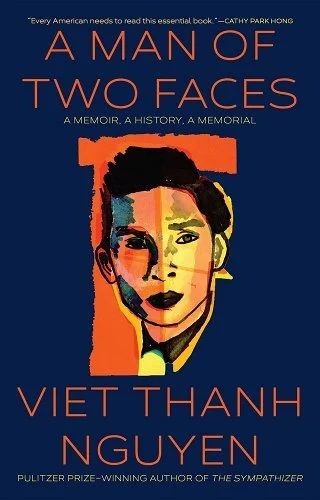[ad_1]
Commenting on a social media post of a Time article titled “The Ukraine War Is Becoming Putin’s Vietnam,” author Viet Thanh Nguyen says, “It was only a matter of time . . . the return of Vietnam as a war, not a country. When the reality is that if any country deserves to be synonymous with war, it is America.” Another post consists entirely of one-star reviews of his Pulitzer Prize–winning novel, The Sympathizer, and their accompanying comments from despondent readers. Like much of his writing, both are exercises in critical comparison. The conclusions, like much of the humor, are unstated. The absurdity of contradictions is implied.
Like any good episode in a larger saga, A Man of Two Faces holds its own unique place in the growing constellation of Nguyen’s writing that builds upon themes of identity complicated by war, racism, and colonial imperialism that have been well established in his previous work through a mix of cultural criticism, history, and family memoir. Fictional characters throughout Nguyen’s two novels, The Sympathizer (2016) and The Committed (2021), and his short story collection, The Refugees (2017), navigate varying degrees of resistance and complicity with dominant political and cultural forces in much the same way that Nguyen describes his own duality in the nonfiction of Nothing Ever Dies (2016) and A Man of Two Faces (2023). Rather than limit himself to questions of what it means to be Vietnamese or American though, Nguyen is more concerned with what it means to remember and what it means to forget, intentionally or otherwise.
Words like re member and disremember add to to the poetry, family photos, and military jargon that describe the nature of memory and forgetting in nonbinary terms. Authors like Theresa Hak Kyung Cha, Marguerite Duras, and Jessica Hagedorn (among others) are referenced by name, but also in the lyricism and form that drifts between poetry and prose throughout. Other references to writers like Carlos Bulosan, John Okada, and Sui Sin Far evoke a milieu of counternarrative even as Arundhati Roy is quoted: “There’s really no such thing as ‘voiceless.’ There are only the deliberately silenced, or the preferably unheard.” Even Philip Roth gets cited as an example of strange Americana that inspires the narrator of The Sympathizer to desecrate his mother’s squid dinner in a way that resembles Alexander Portnoy’s own impulses and subsequent guilt over masturbating into a slice of liver the family eats for dinner.
Between past and present, and from the factual to the speculative, a family history is created rather than merely recalled. Nguyen’s middle-class upbringing in San Jose feels to him like keeping a secret double life from Ba Má (parents): “In Ba Má’s house, you are an American spying on them. Outside their house, you are a Vietnamese spying on Americans and their strange ways and customs, including the forbidden, fantastic world of dating, seen in John Hughes movies like Pretty in Pink and Weird Science and Some Kind of Wonderful.” A summer job at Great America and a secret girlfriend could be enough for any teenager to handle, but for Nguyen, they rank among the family’s more inane dramas compared to Ba Má getting shot on Christmas Eve and a different gunman forcing his way into their home. A memory of being separated from his family only to be placed with a sponsor family who ask him to teach them how to use chopsticks is as confusing as Nguyen’s fragmented recollections of leaving an adopted sister behind to guard a house the family would never return to. But memories raise more questions about narrative authority and about who is allowed to interpret them: “Are you a witness to history because you were there? Can you witness history if you don’t remember it?”
The refrain “This is a war story” positions these family anecdotes as the real heroic struggles amidst the tragedies of nationalized violence. A linguistic explanation of the family-owned grocery store in San Jose suggests that naming it Sài Gòn Mới is in itself an act of defiance, a reminder to other Californians that “we are here because you were there.” Even the family’s rice cooker is resilient, refusing to die after decades of use. Imagining the portrayals of sacrifice that Ba Má make for their children as hypothetical films that Hollywood will never make becomes a kind of running joke, replete with casting suggestions for the actors who will play them.
At times, the immensity of ideas sprawls into current events like George Floyd’s murder and the war in Ukraine, threatening to distract from the adept family memorialization. Yet, the perfect symmetry of doppelgängers ensures enough narrative stability to devote the final third of the book to the impossible task of seeking permission to tell his mother’s story after her dementia and eventual death. Nguyen asks whether memorializing his mother in his own writing can also be a kind of betrayal when “remembering is the least that can be done.” An uneasy peace eventually emerges as Ba prepares to join his wife, not in the country they started from, but in the land they have chosen to call their home. The entanglements offer an ending that is anything but tidy, one devoid of conclusions that asks right up until the very end, “When does duality become duplicitousness? When does having two selves lead not to double vision but to self-deception?”

NONFICTION
A Man of Two Faces: A Memoir, a History, a Memorial
By Viet Thanh Nguyen
Grove Press
Published October 3, 2023

[ad_2]
Source link

